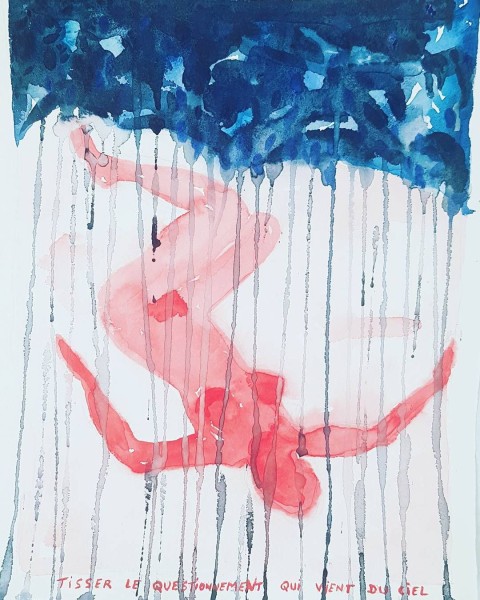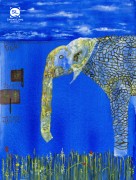We take beach towels and folding chairs to the exposed river bank, where the light can reach us easily. It’s still chilly in the shade. My mother reads while I step from rock to rock in the shallow water until my skin catches up with the cold and eases. Down the river where the water churns someone has posted signs. Do not swim, risky waters, threat of drowning, hand written on birch bark and nailed to every fifth tree. Years ago, I knew the boy that drowned there. The Albino Kid. That’s what everyone called him. Everyone knew his translucent skin, even if they didn’t know him by name.
I knew Thomas a little bit better than not at all. At summer camp he needed to be rubbed with sunscreen every half hour by the teenage counselors, whose faces—propelled by the intimate contact—betrayed a little disgust. To think of it now makes me sad. How Thomas must have felt, already glowing with difference, choosing between the no good options of bothered hands and the sun’s harsh scowl. Once I tattled on him for peeking during Heads Up Seven Up in pre-k and felt immediately ashamed. The summer after kindergarten, he’d brushed his hand on my butt purposefully and I contemplated if that was what the adults meant as a bad touch, but I didn’t tattle ever again. I learned to suffocate embarrassment by keeping it close.
When we reached the summer before the final year of middle school, everyone was ready to be grown. Except Thomas, who would never be. The story broke on local news, then went national. It was August. After the funeral, Thomas’ drowning made me shake with nightmares. My brain conjured his pale body, rising from the river to throw asteroids at my window. It takes only nine minutes to the river from our house, if you walk fast. But in the collapsed universe of the dream world, there he was, an impossible giant smashing my safety, water churning around his waist, moaning to me, wordless. Worldless. Water rushing in.
“Remember Thomas, Mom?” I throw my voice backwards, and my mother puts down her novel in the shape of a roof over bare thighs.
“That boy who drowned?”
“Yeah,” I say, “do you think it was an accident?”
“Of course it was.” My mother puts her hand to her heart. “Shame.”
“Shame,” I say, too.
I pick up a smooth stone for my collection. I’ve turned away, but her eyes are on me. The stone is wet and cool against my hand. I can feel the clawing dogs of her worry jump on my back. My mother is still terrified of the word death, even though it’s been seven years since Thomas, six since me. Afraid I can’t handle it, that I’d razed too close to that sharp edge of nonexistence. As if the mention of death dirtied the atmosphere, made the air unbreathable, unbearable.
It’s true that I had wanted to die, if only for a moment. At the hospital they said it was a cry for help. Not real. But what did they know about me? What did I know—about dying, except the vague intellectual notion that it was possible? About myself at fourteen? It all happened after I fucked the summer away next to the same river where Thomas died. I drowned in different boys until I got what I thought I wanted, hand on my secret belly with a quiet smile. And then I didn’t have it anymore. The toilet filled with a rush of bright red. I hovered outside myself, taking in the color of a small death against the bone-white enamel. Could you even call it a death? As the blood thinned, there was a faceless clot, darker than the rest. I scooped it out and swallowed it quickly, before thought. Almost immediately I threw it up, undetectable in the trash of half digested dinner, and flushed. I had sickened myself, but in a snap the relentless nausea just evaporated. In its place, a gnawing hunger in my stomach that never stopped. I focused the hunger into the razor. I tried to be precise.
When my mother leaves the river, I find a bird, pinned beneath a branch, wing broken. A robin with a breast red as blood. I put my face down to the bird and listen. I push the bird’s good wing with my pinky to see if it will stir. The bird is gone but so perfectly preserved. I lift the branch, then her body off the ground. Hold her gently between cupped palms.
Later that night, when my mother flicks off her bedroom light, I push the stones from the corner of the kitchen table onto a flattened cereal box and climb the stairs to the bedroom I’ve slept in since childhood. On the dresser I lay the cardboard and weight it with stones stacked in careful balance. In the center, the dead robin spreads both wings into full span, one extended further than its twin. The magic trick of the broken bone reaching toward a life it will never live again. I feel the sky above the ceiling, over our heads. It is out there, still. It always is. Over the bone break, I place a clipping from the garden, a Susan—its petals a yellow sun, the center, a black eye, wide open. The cereal tiger looks garish, grinning beneath my altar, but I also like it, what it seems to say.
Today is done. The pillows smell like lilac detergent, the cars, a faint whir in the distance. The inevitability of tomorrow offers a slushy mix of dread and relief. I’m still here / I’m still here, either way. I toss under the sheets: one way, towards the past, one way: the future. Downstairs the television clicks on. Mom is on the couch, letting the soap operas lull her back to sleep, rocking on the waves of other people’s voices, other lives. I feel my way down the stairs in the dark and lift the blanket. My mother’s face looks older in the blue light. She shifts over so I can lie beside her. We create a rhythm with our steady breath.

Notes from Guest Reader Devin Kelly
More than anything, this story contains so much, and as such, it is a testament to vital work of the writer’s gaze, and the possibilities that exist when a writer remains open to the various intersections that occur between lives and within the physical world. When I first read this story, I was amazed at the emotional distance covered. Reading this story feels like witnessing a feeling, and all of the possible questions posed in relation to that feeling, stretched out into the infinite. It shatters and blooms.


 The SmokeLong Grand Micro Contest (The Mikey) is now an annual competition celebrating and compensating the best micro fiction and nonfiction online.
The SmokeLong Grand Micro Contest (The Mikey) is now an annual competition celebrating and compensating the best micro fiction and nonfiction online.